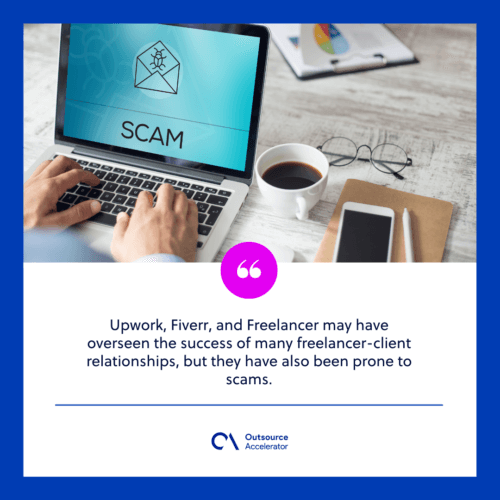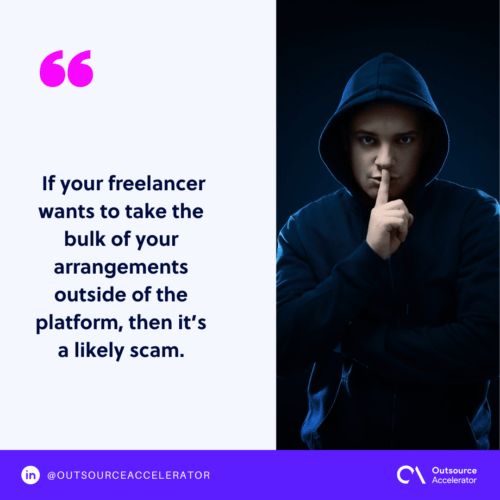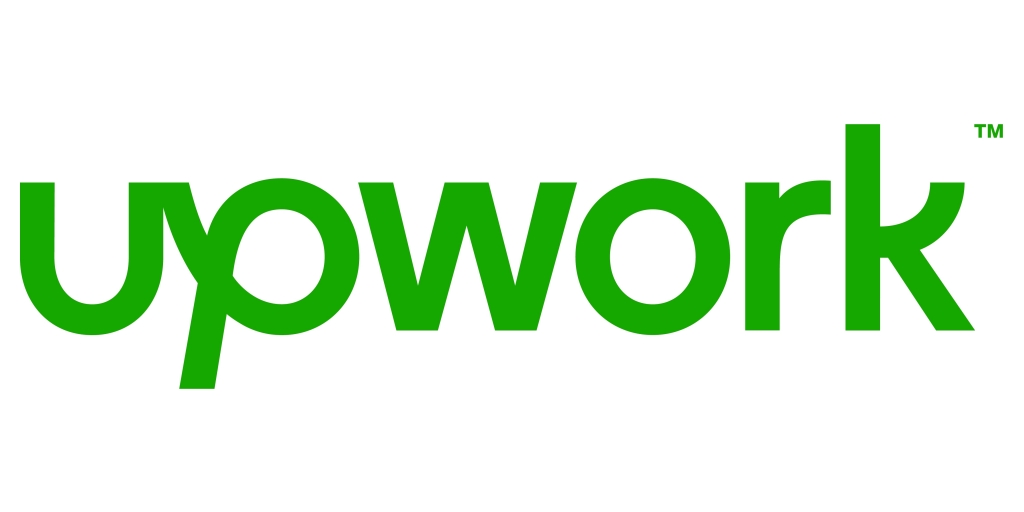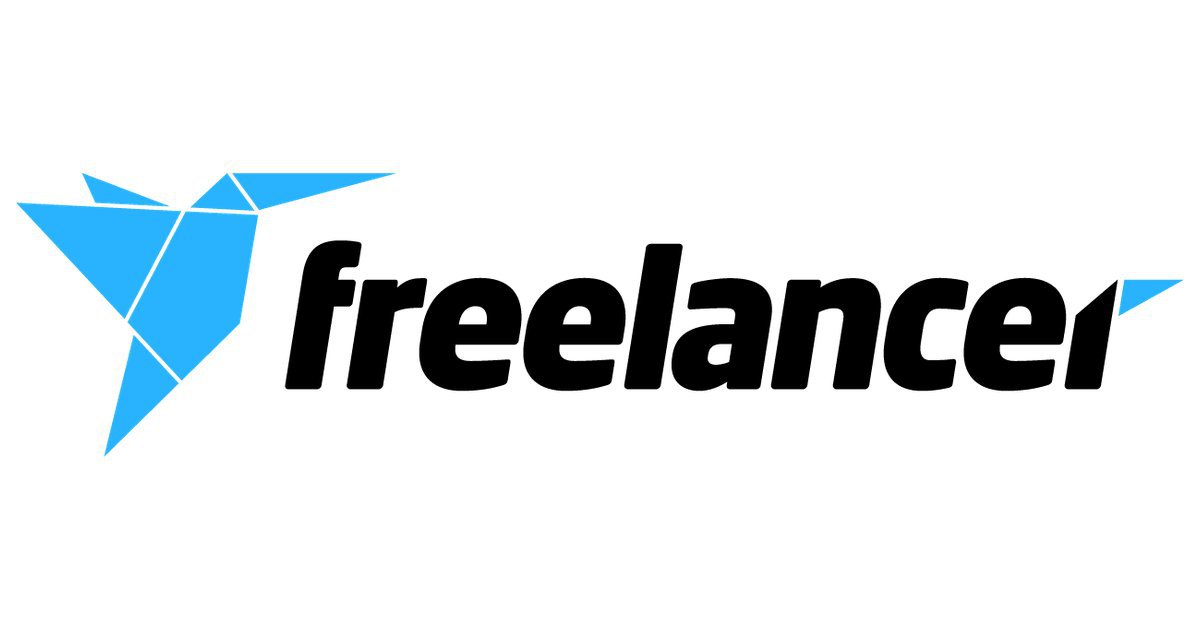How to avoid scams on Fiverr, Upwork, and Freelancer

The rise of the internet and mobile technologies has made it easier to do business online.
Challenging the concept of traditional, office-based work is the idea of freelancing or contracting work as an individual from a remote location.
Nowadays, as long as one has the skills, education, and tools (such as a laptop, headset, and a reliable Internet connection), they are ready to seek out work as a bona fide freelancer.
The freelancing model benefits both freelancers and clients in general.
This model proves compelling to many young professionals across the globe for good reason: time flexibility and creative control, the ability to work with multiple clientele, and a wide range of unique opportunities to grow their portfolio.
On the other hand, clients, usually from small-to-medium enterprises (SMEs), can now contract freelancers at an affordable cost, establish round-the-clock communication, and scale the work from project to project.
To this end, popular freelancing websites like Upwork, Fiverr, and Freelancer were established. These three are among the most prominent web platforms linking an international pool of freelancers to prospective clients.
However, users of these freelancing platforms have also become susceptible to Upwork, Fiverr, and Freelancer scams, as well as other websites. Find out more about these freelancing sites and how you can make the most out of their services securely.
About Upwork
Formerly known as Elance-oDesk in its earliest years, Upwork re-launched in 2015 and, as of today, is one of the biggest freelance marketplaces on the web.
The site boasts as many as 12 million registered freelancers and 5 million registered clients.
The process starts with clients searching for a specific role or posting a project. They can browse the site’s large pool of freelancers’ profiles, interview chosen candidates, share files, and pay online.
Freelancers themselves can also apply to job postings. They’re usually included in a pool of candidates that the client can screen later on.
Android developers, game developers, bookkeepers, data scientists, database administrators, customer service representatives, copywriters, and content writers are some of the most in-demand freelancers on Upwork.
About Fiverr
Upwork’s closest rival is Fiverr, a Tel Aviv-based platform founded in 2010.
The site hosts as many as 3 million job listings or “gigs,” and has, therefore, become an important player in today’s modern “gig economy.” A Fiverr account is free, and freelancers are termed as “sellers.”
Fiverr’s marketplace of freelancers offers work in the areas of graphics and design, writing and translation, programming, web development, video and animation, and others such as crafts or conducting online lessons.
The most popular requests are for logo designs, WordPress customization, voiceovers, and management services for social media accounts.
About Freelancer
Freelancer.com purports to be the biggest freelance network under users and projects listed, with as many as 29 million contractors and clients registered on the site.
Freelancer works within the competitive bidding system, where interested candidates field themselves and their asking prices to be able to take on a job post.
Clients only pay their contractors when the work is 100% completed. Popular search areas on Freelancer.com are SEO marketing, web development and design, mobile app development, collaterals design, article writing, and data entry.
Top 6 Upwork, Fiverr, and Freelancer scams
However convenient, affordable, and egalitarian the freelancer system may be, it also has its faults. Unfortunately, there is a darker side to contracting freelance work.
Upwork, Fiverr, and Freelancer may have overseen the success of many freelancer-client relationships, but they have also been prone to scams.
For over a decade now, some prospective clients have encountered some of the most common scams on Upwork, Fiverr, Freelancer, and other similar sites.

Duplicate accounts
Because the databases of these sites are enormous, it’s impossible to thoroughly screen each user, let alone monitor high volumes of users who create dummy accounts, prey on unlucky clients, leave, and then start the process anew.
This scam happens when a freelancer demands to be paid upfront, then deactivates their site account and runs away with the clients’ hard-earned money before the project even starts.
Copyright infringement
Another unscrupulous Freelancer, Upwork, and Fiverr scam that unfortunately proves quite common is copyright infringement.
Some clients might risk being sued for intellectual property violations because of a freelancer’s plagiarized content or stolen copyrighted images.
Demanding for transactions to be done offsite
This scam is done when freelancers demand that contact and payment be made on channels outside the freelance platforms.
This could put a potential client in a bind, as any suspicious actions undertaken by the freelancer will not be done within the jurisdiction of the website. Therefore, they will not be held accountable for the site’s rules and regulations.
Sudden changes in agreed terms
It is a sticky situation if a client finds a sudden change to the terms that were agreed upon.
A freelancer could extort more money than originally promised and threaten to delay the project if the client does not agree to their demands.
This scam is a frightening and costly situation to find oneself in.
Gaming the system
One of the more horrific scams on Upwork, Fiverr, and Freelancer is the abuse of their Hourly Protection System. Scammers usually engage in “gaming” of the site’s logging system of work-related hours.
Malicious entities could log into the site, run the counter, rack up hours, and charge preposterous amounts for little to no work done.
This is because Upwork’s Hourly Protection System charges for hours of work done as opposed to finished outputs.
Money laundering or phishing
Lastly, there’s a chance that a freelancer is engaged in outright criminal practices, such as money laundering and phishing. These scams extract private information from their would-be employers.
Then, the latter will only know what’s happened when the system has been compromised and the money’s gone.
Upwork, Fiverr, and Freelancer scams: Red flags to look out for
Upwork, Fiverr, and Freelancer have repeatedly assured their users that they are on the lookout for all the scams and suspicious activity on their websites, but the issue persists.
Given the myriad ways that something could go wrong, it’s wise to look out for the red flags or warning signs that a potential candidate for remote work is not who they claim to be.
Here are some red flags to watch out for if you’re contracting through these platforms or are thinking of doing so.
- The freelancer doesn’t have a strong presence. It’s a red flag if your freelancer has scant details about their work experience or won’t show you their portfolio. The worst-case scenario is they have something to hide, so it’s right to demand a face to the name.
- Deals are too good to be true. Both freelancers and clients explore the freelance model to score savings but beware of a freelancer who agrees to be paid less. The real cost could be to your time, productivity, or security.
- Unrealistic expectations are set. Avoid freelancers who overpromise results or act as if the work will be easy. Chances are you’ll receive half-baked deliverables or none at all.
- The freelancer wants to engage offsite. If your freelancer wants to take the bulk of your arrangements outside of the platform, then it’s a likely scam. Don’t trust a candidate who refuses to work according to the safeguards built into the site.
- The freelancer asks for sensitive information. Suffice to say, stay away from candidates who ask for personal information, such as your passwords, mobile number, or personal address.

Upwork, Fiverr, and Freelancer scams: How to avoid them
Protect yourself from Upwork, Fiverr, and Freelancer scams by doing the following:
Verify a freelancer’s identity and reviews
A preliminary Google search should give you enough to make a fair judgment of the candidate. Try to verify their credentials with past work on other websites.
Take note if they are blacklisted or have criminal cases against them.
Also, check the candidate’s ratings on their profile and look for concrete feedback on their previous works for other clients.
Upwork, Fiverr, and Freelancer all host a means to give feedback to the freelancers registered on their sites. Don’t consider anyone who can’t meet your standards.
Cross-check the content you receive
In the cases where this applies, such as for logo design and content, check to see if the piece is original.
Run the articles through a plagiarism checker. There are a lot of reliable free and paid tools in the market, such as Copyscape, that can do a quick plagiarism and comparison check across thousands of websites.
For submitted images such as logos and raw photos, you can do a reverse image search through Google. This is the easiest way to track similar images and see if it is an original work.
Keep your personal info safe
Be careful about who you send your documents, e-signature, photos, and other digital files to. “Better safe than sorry” is a principle that holds. Many scammers, phishers and hackers are getting better and better at posing on these platforms.
As much as possible, avoid transacting with a freelancer outside a specific platform. The site provides basic protection and security for both freelancers and employers in case of malicious activities done by either side.
Once you contact someone for services, agree on a fair payment scheme for both of you. The best option is the milestone-based payment scheme, where you will pay your contractor for each stage of the project properly cleared.

Payment solutions for Upwork, Fiverr, and Freelancer users
Online payments are made easier as well to both clients and freelancers with the help of platforms such as Payoneer to ease the burden of transferring payment for rendered services.
Clients always have to be cautious when sending payment to anyone, anywhere, but platforms such as Payoneer dramatically increase the levels of safety, transparency, and security.
Payoneer is a global payment platform that can be easily linked to your UpWork, Fiverr, or Freelance account.
But unlike any other platform, Payoneer accepts payments in USD, GBP, and EUR. Thus, it makes it easier for freelancers and clients alike to transact in European countries as well.
Common client problems and complaints with Upwork, Fiverr, and Freelancer
Reception to freelance networks from reputable business review sites like Sitejabber and Trustpilot are mixed.
Freelancing sites can be hit-and-miss for the convenience that they pose. Thus, some common problems have emerged out of the woodwork.
Common complaints that arise on UpWork, Fiverr, and Freelancer are:
- Insufficient client protection from unprofessional freelancers
- Immediate suspension of user accounts (even if there is pending business on the line)
- Inadequate quality control, even if the profiles being submitted are screened
- The site’s poor customer relations team
Of the three, Freelancer currently sports the highest assessment. However, Freelancer complaints from clients show that the site is not immune to bogus users and scammers or costly errors such as overcharging for cleared projects.
A million options might be available to you as far as freelancing is concerned. But it’ll be hard to whittle all of those down to a few solid ones.
Given that these complaints can be considered commonplace, where should you go from here? What alternatives are there to the freelance model?
Outsourcing with confidence
Luckily, viable alternatives abound. Instead of contracting freelancers, opt to get in touch with an outsourced service provider—which could still net you the savings and convenience without the unnecessary worries.
How to avoid outsourcing scams
Some of the best reasons to hire an outsourced agency to fill the gaps in your business processes are:
- Hiring an outsourced agency is cost-effective and scalable. You can choose the amount of work, the number of staff, and the project timeframe that adheres to your budget.
- It will be easier to draw up documentation and settle on your own terms with an agency.
- You won’t have to deal with the complaints that are limited to the sprawling freelancer networks. This includes delays in the middleman’s customer services or payment issues.
- Agencies are typically held to stricter service standards and protocols. You’ll surely benefit from this uniform consistency in how they’ll deliver their work.
- Outsourced agencies have a higher level of accountability—to you and to the trade and employment laws of the country in which they are incorporated.
This isn’t to say that you will have fewer options to choose from. On the contrary: you’ll have the chance to source talent among industry leaders in the BPO industry that might already have good reputations in their home countries and offshore.
Thus, there are greater chances of you getting the quality work that you reserve and getting those returns on your investment.
How to start outsourcing
Consider looking into outsourcing as an alternative to freelancing—and reap the best people from the global talent pool.
If you’re curious about outsourcing and would like to get started, complete this form and get 3 free quotes from Outsource Accelerator.
We feature a wide directory of BPOs that specializes in customer service, digital marketing, finance and accounting, and so much more.










 Independent
Independent




